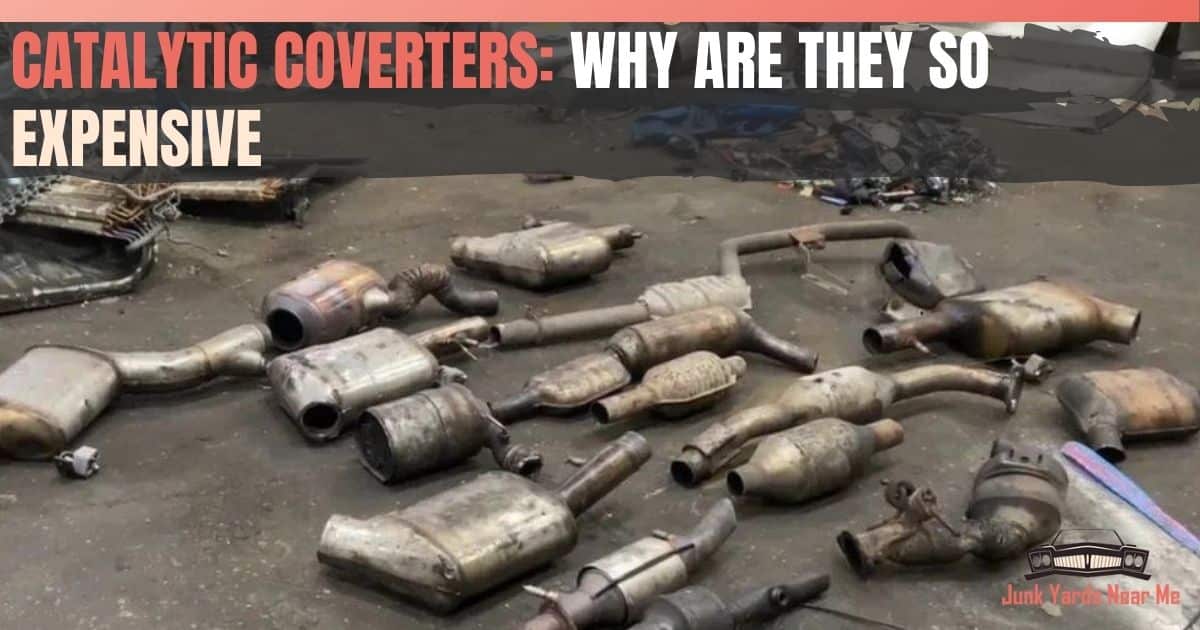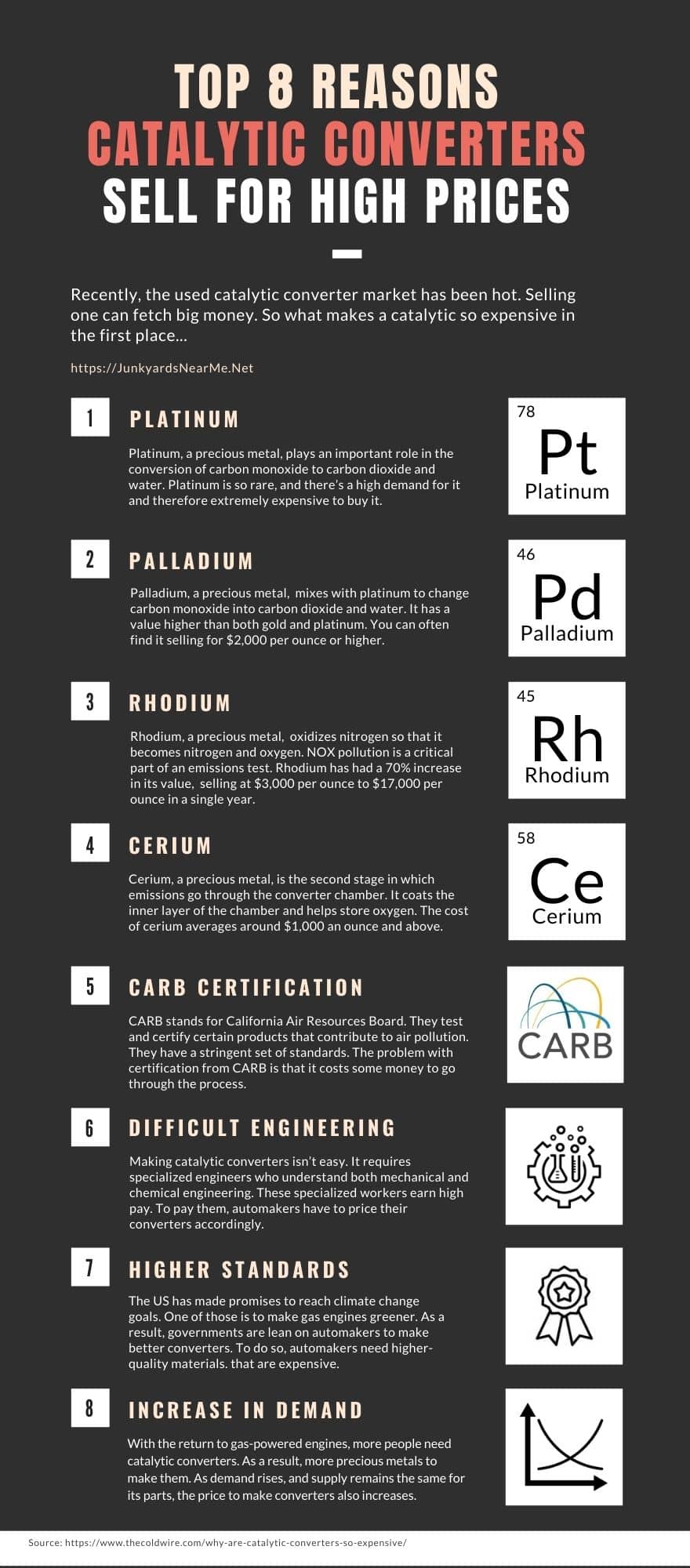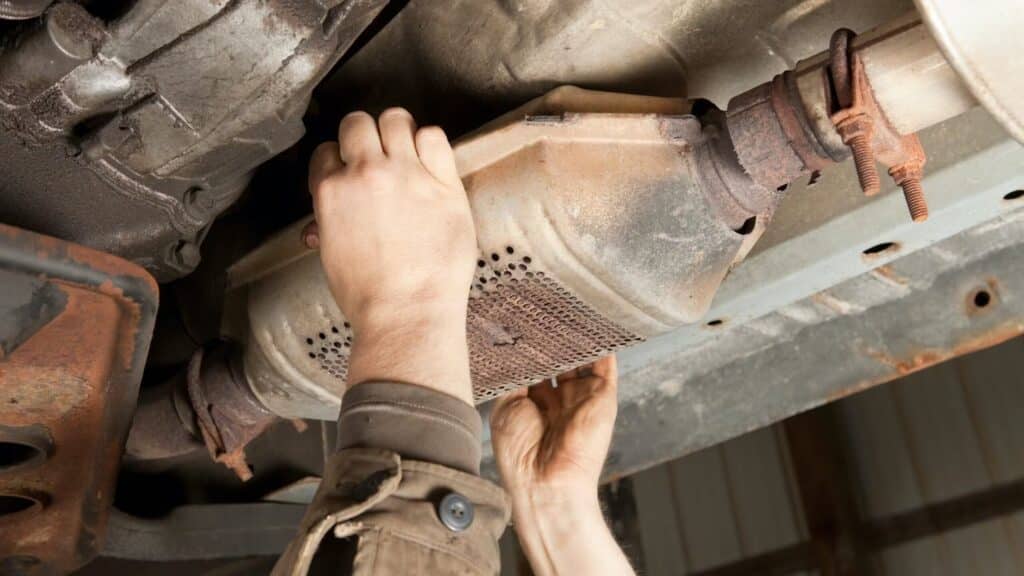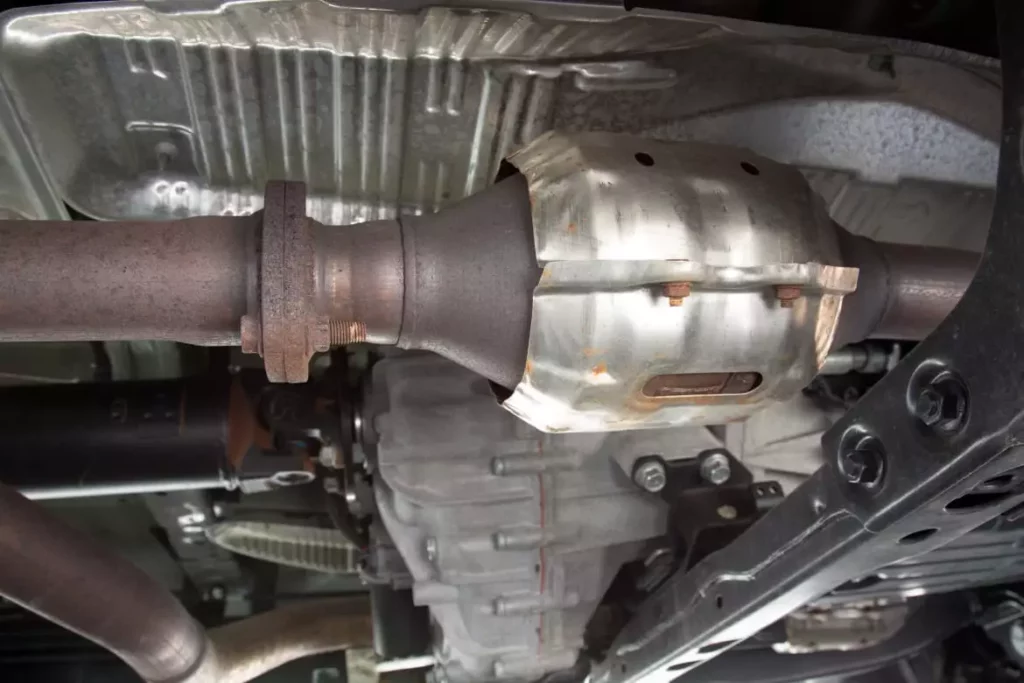
The catalytic converter is one of your vehicle’s most priceless and crucial components. Without it, your car would not be able to filter out and reduce harmful emissions such as nitrogen oxides, carbon monoxide, and hydrocarbons. Because of this essential function, catalytic converters are in high demand.
Unfortunately, recent reports have shown that this makes them the vehicle part that’s more likely to be stolen. Also, their absence comes with dire consequences like loud vehicle noises, reckless driving, and increased air pollution.
But what makes catalytic converters so expensive? The following are some reasons why these single-car components cost a lot and why everybody is looking to find places where to sell catalytic converters.
Catalytic Converters: What Makes Them So Expensive?

Catalytic Converters Contain Precious Metals
Your car’s catalytic converter is made with some of the most precious metals on earth, no wonder the a rise in theft cases. These metals are Platinum or other Platinum-like metals such as palladium and rhodium. These metals majorly act as catalysts in a chemical reaction meant to change the states of emissions from your car.
Palladium
In the last couple of years, the price of this metal has significantly skyrocketed. Its use in catalytic converters has vastly reduced car emissions of toxic nitrous oxide and carbon monoxide. The more palladium used in a catalytic converter, the more efficiently it reduces harmful emissions.
For more info on Palladium, click here.
Platinum
The primary role of Platinum in the catalytic converter is to convert hydrocarbons and carbon monoxide. This simply means it mixes with palladium or rhodium to break down the very toxic compounds to less poisonous emittances such as water and carbon iv oxide.
If you thought gold was the most valued metal, well, you were wrong. Apart from being very dense, Platinum is valued higher than silver and gold.
The other factors that make Platinum a valuable metal include its high boiling point, efficiency, and the fact that its interactions with other poisonous compounds do not go beyond the surface.
For more info on Platinum, click here.
Rhodium
In the whole world, only South Africa and Russia mine Rhodium, and this scarcity is a major contributor to its high value and price. In a catalytic converter, the role of rhodium is to break nitrogen oxides into two components; oxygen and nitrogen, which are less hazardous gases.
For more info on Rhodium, click here.
Cerium
Is another precious metal, but not as rare as Palladium, Platinum, or Rhodium. Nonetheless, it trades for big money on the metals market. Cerium is part of the second stage of the process as it coats the inner layer of the auto part and stores oxygen.
For more info on Cerium, click here.
High Standards And Expectations for Pollution Reduction
As climate changes and their effects on the world continue to top headlines, most countries are trying to keep up by shifting to more environmentally friendly solutions to everything.
Part of this effort is to make eco-friendly gas engines. But typically, no engine can fully produce perfect combustion without raising environmental concerns.
There is an obvious necessity to make more efficient catalytic converters for cars to achieve the set standards. The manufacturing of more efficient catalytic converters requires high-quality materials and equipment. And, meeting these standards means higher production costs, equaling even a higher prices for a catalytic converter.
California for example is one of the leading US states in setting standards in pollution reduction. Since their standards for the state are higher, manufacturers try and make converters that meet the California Air Resources Board (CARB) standard. The logic is that if the converters meet the highest state standards, then all other states will be compliant.
Rising Demand and Lower Supply
The escalating demand and dwindling supply of catalytic converters highlight a pressing issue within the automotive sector’s dedication to environmental conservation. In the context of the global imperative to reduce carbon dioxide emissions, catalytic converters have emerged as indispensable components in the exhaust system of internal combustion engines. These devices play a pivotal role in abating the environmental impact by transforming detrimental exhaust gases, such as nitrogen dioxide, emanating from the combustion chamber of internal combustion engines into less harmful compounds. The manufacturing of catalytic converters, especially the three-way catalytic converter, has experienced heightened demand owing to stringent regulations enforced by environmental protection agencies worldwide.

However, the supply chain for these crucial components has struggled to keep pace, resulting in a shortage. Manufacturers are diligently engaged in developing catalytic converters that not only efficiently convert harmful gases but also align with the evolving standards mandated by regulatory bodies. The inaugural first production catalytic converter laid the foundation for advancements in emissions control, and contemporary most catalytic converters integrate sophisticated technologies to ensure a cleaner and healthier environment. As the automotive industry endeavors to reconcile the surging demand for these environmental guardians with production challenges, innovative solutions are imperative for realizing a sustainable future.
Every day, there are people who want to change or repair their current catalytic converters. No matter the situation, people continue to use their cars often.
There are also millions of new car owners daily, increasing the demand for catalytic converters. Another factor that has continually contributed to the high demand for catalytic converters is the transition of most people from diesel engines to gasoline-powered engines. This transition is to enable them to adopt a more environmentally friendly option.
Unfortunately, this rise in demand isn’t met with an equal increase in supply. Instead, the effect is a high rise in the prices of the few catalytic converters available in the market.
Catalytic Converters Are Difficult To Engineer
From the simplest task of analyzing the various raw materials to the selection, assembly, and final product, catalytic converters take a lot of work.
The entire process of putting together a catalytic converter is time-consuming and requires very skilled chemical and mechanical engineers, whose hiring is expensive. In case of any mistakes in the procedure, there will be a need to buy more materials and contribute to additional costs.
The catalytic converter is put through several tests during the engineering process to make sure it is efficient and functions as necessary. All of these steps take time and money. The consequence is a higher cost of the final catalytic converter.
Theft Cases
Another factor that makes catalytic converters so expensive is the increase in theft cases. Most cars have catalytic converters positioned underneath the vehicle’s exhaust outlet. This position is exposed and makes it very accessible.
When people steal catalytic converters, they want to access the precious metals and resell them in the black market. Unknown to many, increased theft cases only worsen the situation in the marketplace by putting the demand way higher than the supply.
Some vehicles that are very vulnerable to catalytic converter theft are Lexus RX and Toyota Prius. This is because they are hybrid models with higher concentrations of precious metals.
Stolen catalytic converters are often reused by other car owners or sold to local metal dealers for fast cash.
Effects Of A Global Pandemic
When COVID-19 struck, several businesses and companies, including those forced to shut down operations. This shutdown has resulted in less supply of catalytic converters.
The pandemic has also led to lockdown and restriction of transport and trading activities, including essential imports and exports. As a result, shipping has slowed down, and for places it is available, the costs are higher than they have ever been.
Why Are Catalytic Converters So Expensive? – Conclusion
Generally, when pricing a catalytic converter, various factors come into play. It is therefore difficult to price them lower with everything in place.
With this in mind, you can go out of your way and put in place a few measures to protect your car’s catalytic converter from theft. For example, always park safely and don’t leave your vehicle in areas that are deserted, not adequately lit, and have no security cameras. Instead, be more careful and install vibration-triggered alarms and a protective device to deter theft of your car’s catalytic converter.
In addition, avoid driving a car without a catalytic converter. Apart from helping you avoid trouble with authorities and paying a fine, it will prevent toxic pollutants from contaminating the air.

